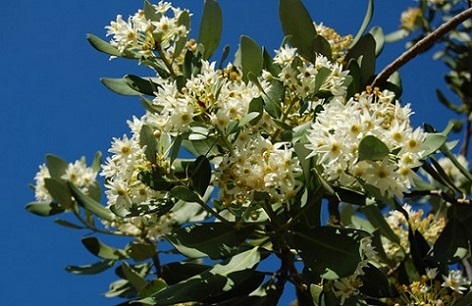Herbs And Phytochemicals: Sesquiterpenes from Drimys Winteri Exhibit Antimicrobial Activity Against Multiresistant Microorganisms
Nikhil Prasad Fact checked by:Thailand Medical News Team Jun 21, 2024 10 months, 5 days, 18 hours, 13 minutes ago
Herbs And Phytochemicals: In a breakthrough study, researchers from Chile have discovered powerful new antibiotics from the bark of the Chilean tree Drimys winteri, also known as Winter's Bark. These natural compounds, called drimane sesquiterpenes, have shown remarkable effectiveness against several multidrug-resistant bacteria, fungi, and other pathogens. This exciting discovery could pave the way for new treatments to combat the growing threat of antibiotic-resistant infections.
 Herbs And Phytochemicals: Sesquiterpenes from Drimys Winteri Exhibit
Herbs And Phytochemicals: Sesquiterpenes from Drimys Winteri Exhibit
Antimicrobial Activity Against Multiresistant Microorganisms
The Source of the New Antimicrobials - Drimys Winteri
Drimys winteri is a tree native to southern Chile and Argentina, thriving in humid and marshy lands. Its bark contains a variety of natural compounds, including drimane sesquiterpenes such as polygodial, isopolygodial, and drimenol. Researchers have also created synthetic derivatives from these compounds to enhance their biological activities.
Powerful Antimicrobial Activity
The
Herbs And Phytochemicals study tested ten drimane sesquiterpenes, including natural and synthetic versions, against a range of dangerous pathogens. The results were impressive:
-Bacteria: Polygodial, the most potent compound, was highly effective against bacteria like Klebsiella pneumoniae, Enterococcus avium, Escherichia coli, and Salmonella typhi. It exhibited strong bactericidal (killing bacteria) and inhibitory (preventing growth) properties.
-Fungi: Polygodial also showed significant antifungal activity against common yeast infections like Candida albicans and other Candida species. It effectively inhibited the growth and disrupted the membranes of these fungal cells.
-Oomycetes: These compounds were tested against Saprolegnia parasitica and Phytophthora cinnamomi, pathogens responsible for diseases in fish and plants. The drimane sesquiterpenes exhibited strong anti-oomycete activity, offering a potential solution for agricultural and aquaculture industries.
Mechanism of Action
The effectiveness of these compounds is attributed to their unique chemical structures. Polygodial, in particular, contains an aldehyde group that disrupts the membranes of microbial cells, leading to cell death. This aldehyde group also facilitates the formation of reactive derivatives that enhance antimicrobial activity. Additionally, these compounds can interfere with essential microbial processes like oxygen consumption and oxidative phosphorylation, crucial for their survival.
A Step Towards New Treatments
The discovery of these natural compounds from Drimys winteri is a significant step towards developing new antimicrobial treatments. With the rise of
antibiotic-resistant infections posing a global health threat, finding effective and natural alternatives is more critical than ever. These drimane sesquiterpenes offer a promising new approach to fighting infections that no longer respond to conventional antibiotics.
Challenges and Future Directions
While the initial results are promising, there is still much work to be done before these compounds can be used as treatments. Researchers need to conduct further studies to understand their full potential and safety. Clinical trials will be necessary to determine their effectiveness in humans and their potential side effects.
Additionally, large-scale production of these compounds needs to be explored. While the natural extraction from Drimys winteri is a starting point, synthetic production methods could provide a more sustainable and scalable solution.
Conclusion: Hope on the Horizon The discovery of drimane sesquiterpenes from the Chilean tree Drimys winteri marks an exciting advancement in the fight against antibiotic-resistant infections. These natural compounds have demonstrated powerful antimicrobial properties, offering a glimmer of hope for new treatments. As research progresses, these findings could lead to the development of new, effective antibiotics that could save countless lives and combat the growing threat of superbugs.
This breakthrough highlights the importance of exploring natural sources for new medicines and the potential of nature's own solutions to address some of the most pressing health challenges of our time.
The study findings were published in the peer reviewed journal: Molecules.
https://www.mdpi.com/1420-3049/29/12/2844
For the latest on
Herbs And Phytochemicals, keep on logging to Thailand Medical News.
Read Also:
https://www.thailandmedical.news/news/herbs-and-phytochemicals-bavachin-from-psoralea-corylifolia-rejuvenates-sensitivity-of-colistin-against-drug-resistant-gram-negative-bacteria
https://www.thailandmedical.news/news/herbs-and-phytochemicals-geraniin-from-elaeocarpus-sylvestris-inhibits-herpes-simplex-virus-1
https://www.thailandmedical.news/news/herbs-and-phytochemicals-antiviral-properties-of-milk-thistle
https://www.thailandmedical.news/news/herbs-and-phytochemicals-methyl-rosmarinate-from-rabdosia-serra-is-an-allosteric-inhibitor-of-sars-cov-2-3cl-protease
https://www.thailandmedical.news/news/herbs-and-phytochemicals-wedelolactone-from-herbal-plants-eclipta-alba-and-wedelia-calendulacea-shows-promise-in-inhibiting-herpes-simplex-virus
